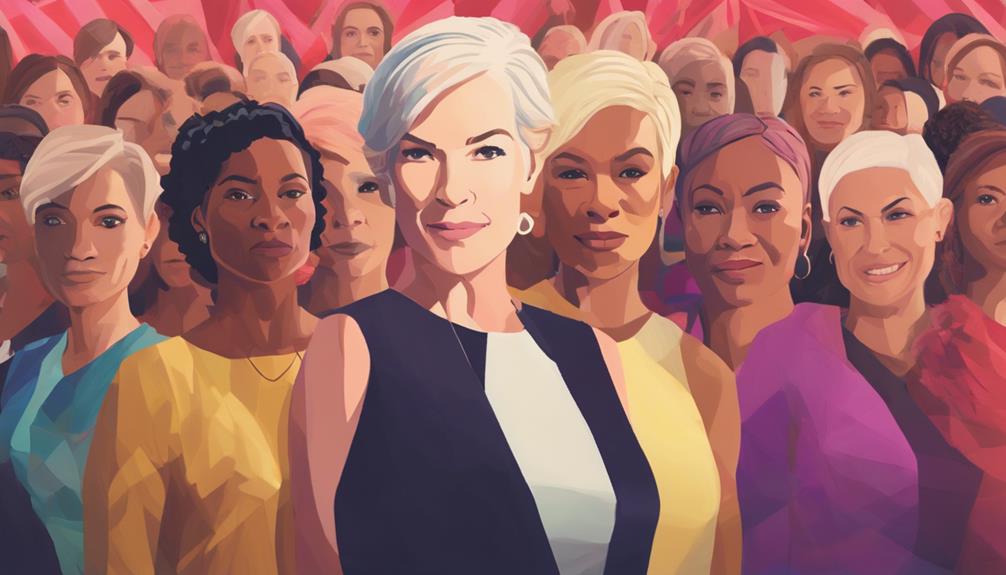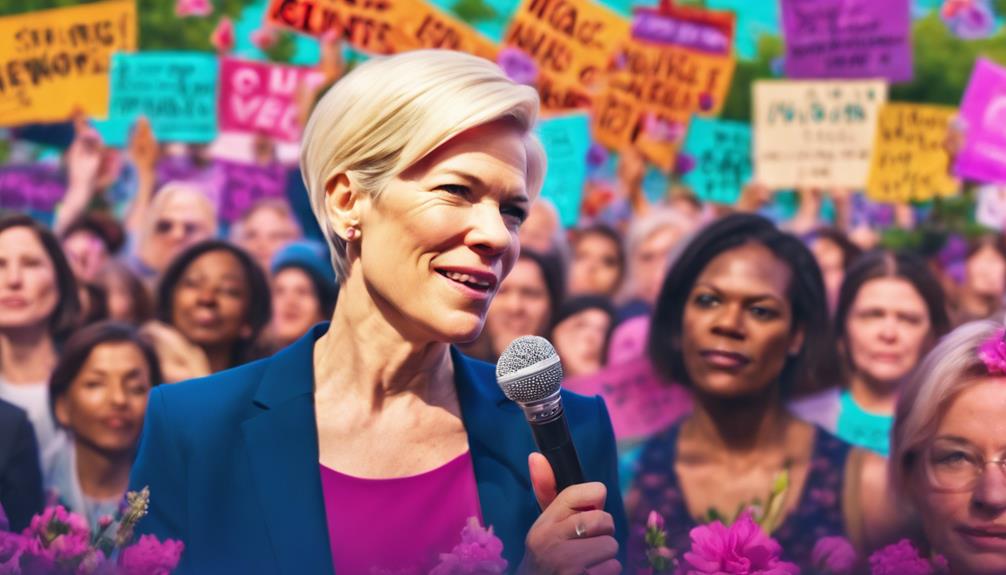Cecile Richards is a formidable leader in the fight for women's rights, pushing against systemic barriers to guarantee access to healthcare and encourage political involvement. As the former President of Planned Parenthood, she expanded resources for millions while co-founding Supermajority to empower diverse voices in politics. Motivated by her upbringing and collective activism, she's been instrumental in mobilizing women, training over 46,000 to engage in political processes since 2016. With a focus on reproductive rights and community advocacy, Cecile's efforts continue to reshape the landscape for women today. Discover more about her impact and initiatives that are driving change.
Background Information
Cecile Richards' journey in activism began in Texas, where her upbringing shaped her commitment to women's rights.
Her impressive career includes leadership roles that have earned her a place in the National Women's Hall of Fame.
As you explore her background, you'll see how these experiences fueled her passion for advocating gender equality.
Texas Upbringing and Activism
Raised in a matriarchal Texas household, Cecile Richards was profoundly influenced by her mother, Ann Richards, whose prominent political career highlighted the importance of female leadership and activism. This Texas upbringing shaped Cecile's understanding of women's rights and instilled a passion for political activism. She witnessed the limited career options available to women, fueling her commitment to social justice and equitable opportunities.
Attending University of Texas Lady Longhorns basketball games exposed her to female empowerment in traditionally male-dominated arenas, reinforcing her belief in the power of women in leadership roles. Dinner table conversations often revolved around civic engagement, encouraging her to become an advocate from a young age.
Cecile also observed gender stereotyping in educational settings, where differences in award recognitions for boys and girls became apparent. This motivated her to challenge societal biases and promote equal opportunities for future generations.
Through her Texas upbringing, Cecile Richards emerged as a dedicated champion for women's rights and a fierce advocate for social change, embodying the values of leadership and activism that her mother so passionately represented.
National Women's Hall of Fame
Established in 1969, the National Women's Hall of Fame honors the remarkable achievements of women who've greatly impacted various fields and the ongoing fight for gender equality.
Located in Seneca Falls, New York, this institution serves as a tribute to women's historical contributions and the pivotal role they've played in shaping society.
Inductees like Susan B. Anthony, Harriet Tubman, and Eleanor Roosevelt exemplify the spirit of women's rights and empowerment.
Their stories not only highlight their individual successes but also inspire you to recognize the importance of education in understanding these milestones.
The Hall aims to educate the public about women's achievements through engaging exhibits, programs, and events that celebrate their contributions.
Previous Leadership Positions
Richards' leadership journey includes pivotal roles that shaped her commitment to women's rights and social justice. As the President of Planned Parenthood from 2006 to 2018, Cecile Richards oversaw more than 600 health centers, considerably expanding access to reproductive health care for countless women.
Before this impactful role, she served as the Deputy Chief of Staff for House Democratic Leader Nancy Pelosi, where she honed her skills in legislative strategies and party leadership.
In 2004, Richards founded America Votes, a coalition dedicated to grassroots organizing and enhancing voter participation through collaboration among 42 organizations. Her efforts didn't go unnoticed; she was recognized as one of TIME's 100 Most Influential People in both 2011 and 2012, highlighting her contributions to women's rights and social justice.
In 2019, she co-founded Supermajority, a national organization aimed at mobilizing a diverse community for gender equality. This initiative empowers women from various backgrounds to engage in political activism, reinforcing her lifelong mission to advocate for women's rights and social justice.
Through these leadership positions, Cecile Richards has consistently championed the cause of women, making a lasting impact in the field.
Current Updates or Main Focus

Cecile Richards is currently focusing on critical advocacy for reproductive rights, ensuring that women's voices are heard in the political arena.
You'll see her shift to nonprofit leadership shaping new initiatives that empower diverse women to engage in advocacy.
Advocacy for Reproductive Rights
Advocacy for reproductive rights remains essential as women face increasing challenges in accessing fundamental healthcare services, often fueled by political opposition and restrictive legislation.
Cecile Richards, the former President of Planned Parenthood, has been at the forefront of these efforts, successfully expanding the organization's supporter base to over 12 million during her tenure. She championed the cause of reproductive rights, ensuring that Planned Parenthood could serve 2.4 million individuals annually despite organized opposition.
Richards emphasizes the importance of political engagement among pro-choice women to shape policies that impact reproductive rights. She believes that raising public awareness is essential in countering the threats posed by proposed legislation.
Under her leadership, Planned Parenthood has tackled high maternal death rates and provided essential access to contraception, remaining a key healthcare provider amidst a challenging landscape.
Today, Planned Parenthood's advocacy work is more important than ever as women's rights face constant scrutiny. With ongoing efforts to protect and expand access to reproductive health services, you can be part of the solution by supporting advocacy initiatives that empower women and safeguard their healthcare choices.
Transition to Nonprofit Leadership
Shifting into nonprofit leadership, Cecile Richards co-founded Supermajority to mobilize a diverse community committed to gender equality and women's rights. Launched in 2019, Supermajority focuses on grassroots organizing to elevate women's issues in political agendas. Under her guidance, the organization fosters a multiracial, intergenerational movement, empowering women from all backgrounds to engage in activism.
Richards collaborates with renowned activists like Alicia Garza and Ai-jen Poo, amplifying voices advocating for gender equity and social justice. Supermajority provides essential resources and training for women who aspire to run for political office, considerably contributing to the increased interest in women candidates since the 2016 elections.
In her role, Richards emphasizes the importance of resilience and strategic grassroots organizing, addressing the systemic challenges women face. She believes that effective nonprofit leadership hinges on mobilizing communities to drive change and guarantee women's rights remain a priority in political discourse.
Through Supermajority, you see how Richards is shaping the future of activism, creating opportunities for women and paving the way for a more equitable society.
Emerging Initiatives in Advocacy
Emerging initiatives under Supermajority are redefining how women engage in political processes, creating new pathways for activism and leadership.
Co-founded by Cecile Richards in 2019, Supermajority mobilizes a multiracial, intergenerational community to advocate for gender equality and elevate women's issues on political agendas. You'll find that the initiative focuses on training women from diverse backgrounds for political activism, reinforcing the idea that women make up a majority in societal influence.
Under Richards' leadership, Supermajority collaborates with prominent activists like Alicia Garza and Ai-jen Poo, enhancing outreach and engagement in women's rights initiatives.
This organization has successfully organized events and campaigns that promote healthcare access and advocate for fair workplace policies, fostering community empowerment among women activists.
Detailed Analysis

Let's take a closer look at Cecile Richards' recent advocacy campaigns and how they shape media representation and public perception.
You'll see how her efforts empower women through activism and create a lasting impact on gender equality.
These points highlight not just her achievements, but also the ongoing challenges in the fight for women's rights.
Recent Advocacy Campaigns Overview
Cecile Richards has spearheaded recent advocacy campaigns through Supermajority, focusing on empowering women to engage in politics and champion gender equality. Since co-founding Supermajority in 2019, the organization has mobilized a diverse community to elevate women's rights in political discussions. Under Richards' leadership, Supermajority has trained thousands of women to run for office, emphasizing that women's representation is crucial for positive policy change.
The organization tackles systemic barriers, particularly in healthcare and reproductive health, addressing issues that directly affect women's lives. With a significant push for voter engagement, Supermajority has seen over 46,000 women seek training to participate in politics, especially after the 2016 election. This surge in political awareness highlights the critical role women play in shaping governance.
Moreover, Richards advocates for essential policies like paid family leave and affordable childcare, working to create a more equitable society. Through these efforts, Supermajority not only champions gender equality but also guarantees that women's voices are heard and valued in every political arena. This all-encompassing approach makes a tangible impact on the future of women's rights.
Media Representation and Public Perception
Recognizing the power of media representation, it's clear that how women are portrayed markedly shapes public perception and influences political discourse around women's issues.
The emergence of The 19th, a nonprofit newsroom dedicated to gender and politics, highlights the importance of accurate and diverse storytelling. When you see women in leadership roles through various media channels, it fosters a more informed electorate and promotes engagement in women's rights initiatives.
Research shows that increased media coverage of women in political office correlates with heightened public support for women's rights. For instance, during events like the Women's March, media representation amplifies the voices of women, raising awareness about their challenges. This kind of portrayal not only empowers women but also enhances voter engagement, as evidenced by the record turnout of women voters in recent elections.
Positive depictions of women leaders can shift public perception, encouraging more people to become active participants in political discourse. By elevating women's stories, media representation plays an essential role in shaping a society that values women's leadership and advocates for gender equality.
Empowering Women Through Activism
Media representation not only shapes perceptions but also inspires women to take action, leading to a surge in activism that empowers them to advocate for their rights and participate in leadership roles.
Cecile Richards has been instrumental in this movement, co-founding Supermajority in 2019 to unite a diverse community around gender equality and women's rights. Her work emphasizes the importance of reproductive health, ensuring women have access to essential resources and education.
The impact of grassroots organizations is significant, as they mobilize women to engage politically and seek leadership roles. Post-2016, there was a remarkable increase in women's political engagement, with over 46,000 women pursuing training to run for office. This surge demonstrates a collective commitment to representation and advocacy within governance.
Cecile's leadership at Planned Parenthood, where she expanded the supporter base to 12 million, showcases the power of activism in addressing vital issues. Events like the Women's March in 2017 further galvanized women globally, highlighting their collective strength and resulting in increased voter turnout and female candidates.
Through these efforts, women are reclaiming their rights and reshaping the political landscape for future generations.
Public Reaction or Expert Opinions

You might've noticed how viral tweets and social media buzz have amplified the conversation around women's rights lately.
Activism, especially in the wake of movements like #MeToo, is playing an essential role in shaping public opinion and influencing policy changes.
As you engage with these discussions, consider how these platforms are empowering voices and driving significant shifts in legislation.
Viral Tweets on Women's Rights
Viral tweets on women's rights spark intense discussions, reflecting a society grappling with both support and resistance to issues like reproductive health and gender equality.
Cecile Richards, a leading advocate for women's rights, has harnessed social media to amplify these conversations. Her tweets often resonate widely, driving attention to pivotal topics such as reproductive rights and the ongoing challenges women face.
The #MeToo movement illustrates how social media can mobilize grassroots activism, with viral tweets calling for accountability and highlighting gender disparities. You may notice that public reactions to these tweets are mixed—some voices passionately support the call for change, while others push back, revealing the polarized opinions surrounding these critical issues.
Richards' influence extends beyond her own tweets; she inspires younger generations to engage with women's rights topics more actively. Data shows that social media campaigns led by women activists have greatly increased awareness, especially among younger demographics.
As these conversations continue to unfold online, the impact of viral tweets on women's rights will likely shape the future of advocacy, encouraging more individuals to join the fight for equality.
Social Media Buzz on Activism
Social media has become a powerful platform for activism, with users rallying around women's rights and sparking meaningful dialogues that reflect a growing demand for change. The Women's March in 2017 mobilized millions, showcasing a collective commitment to social justice issues. This momentum has only intensified since, especially post-2020 elections, where over 26,000 women expressed interest in political engagement, aiming to amplify their voices in leadership roles.
Women are at the forefront of advocating for reproductive rights and healthcare access, leveraging social media to mobilize support and influence legislative change. After the Women's March, a staggering 86% of calls to representatives were made by women, demonstrating the tangible impact of online activism.
Additionally, the #MeToo movement has gained unprecedented traction on social media, reflecting widespread public support for gender equality and accountability in addressing sexual harassment. Organizations like EMILY's List report record engagement from women voters, emphasizing how social media energizes women to participate in political processes.
This buzz on social media not only raises awareness but also fosters a sense of community, driving the conversation forward on women's rights and activism.
Activism's Role in Policy Change
Activism has emerged as a crucial force in shaping policy change, empowering women to demand their rights and influence legislative agendas.
You've likely seen how grassroots organizing has mobilized countless individuals, particularly around issues like reproductive rights and healthcare access. The Women's March, for instance, inspired over 26,000 women to express interest in running for office since 2016, showcasing the impact of collective action on political representation.
Public reaction to proposed healthcare changes during the Trump administration highlighted women's advocacy, as only 12% approved of the plan, with women making up 86% of calls to representatives. Movements like #MeToo have reshaped cultural narratives and spurred legislative discussions, emphasizing the significance of activism in promoting women's rights.
Moreover, women of color have been instrumental in recent electoral successes, illustrating how targeted activism can influence key races and policy decisions.
Organizations such as Planned Parenthood continue to support millions, even amid political opposition, thanks to sustained grassroots efforts. In this way, activism isn't just about raising awareness; it's a powerful tool for driving real change in policies that affect women's lives.
Broader Implications

As you consider the broader implications of Cecile Richards' work, think about how her efforts are shaping women's leadership roles and fostering increased funding for women's programs.
Her initiatives have transformed women's political engagement, paving the way for a new generation of activists and leaders.
This shift not only impacts individual lives but also redefines societal norms around gender equality.
Shaping Women's Leadership Roles
Cecile Richards' efforts have notably transformed women's leadership roles, creating pathways for increased representation and engagement in politics. Through her work with EMILYs List, she's helped elevate women's rights and fostered political leadership among women, resulting in nearly 40% of women in the Democratic caucus in Congress today. This achievement showcases the effectiveness of training programs that empower women to run for office.
Richards co-founded the Supermajority initiative, which focuses on mobilizing a diverse, multiracial, and intergenerational community to prioritize women's issues in political discourse. This initiative emphasizes inclusive leadership, ensuring that varied perspectives are represented in governance.
Historical trends reveal that when women run for office, voter engagement rises considerably, underscoring the positive impact of female candidates on civic participation.
Richards' advocacy has inspired over 46,000 women to pursue training for political office since the 2016 election, demonstrating a ripple effect in women's leadership aspirations.
Increased Funding for Women's Programs
Increased funding for women's programs not only enhances access to important health services but also drives broader societal benefits that empower communities and foster economic growth.
By investing in reproductive health, you're ensuring that organizations like Planned Parenthood can reach millions, particularly those at or below the poverty line. This increased funding leads to improved economic outcomes, as women who receive health services are more likely to reinvest their earnings into their families and communities.
Moreover, extensive sex education is essential in addressing teenage pregnancies, which many parents disapprove of. Increased funding can help develop and maintain these important educational programs.
When women's rights organizations receive adequate support, you see a remarkable boost in voter engagement among women. This participation is critical for more representative governance, which ultimately benefits society as a whole.
In essence, when you advocate for increased funding for women's programs, you're not just supporting health services; you're also promoting long-term societal stability and economic growth, ensuring that empowered women can lead their communities toward a brighter future.
Transforming Women's Political Engagement
Transforming women's political engagement has become a powerful force in reshaping governance, guaranteeing that diverse voices and perspectives are included in decision-making processes.
Cecile Richards, co-founder of Supermajority, has driven this transformation by mobilizing a multiracial, intergenerational community focused on women's rights. This shift was palpable during the 2020 elections, where women voters greatly influenced outcomes and led to the highest representation of women in Congress in history.
Organizations like EMILY's List have trained thousands of women to step into political roles, highlighting the importance of targeted support for women's political activism. With nearly 40% of the Democratic caucus now composed of women, it's clear that these efforts are paying off.
The Women's March in 2017 ignited a sustained commitment to women's rights, encouraging over 26,000 women to express interest in running for office.
As awareness of issues like reproductive health care grows, grassroots movements have emerged as crucial catalysts for change. By advocating for policy reforms, these movements demonstrate that when women engage politically, they can reshape discourse and guarantee that diverse representation isn't just a goal but a reality in governance.
Frequently Asked Questions
Who Was the Leading Lady for Women's Rights?
When you think of the leading lady for women's rights, consider figures like Ruth Bader Ginsburg or Malala Yousafzai. Their unwavering dedication to equality and justice continues to inspire countless individuals around the world.
Who Was the Woman Who Worked for Women's Rights?
You might consider many women who worked tirelessly for women's rights. Activists like Susan B. Anthony and Betty Friedan fought for equality, paving the way for future generations to continue advocating for gender justice and reproductive health.
How Is Laila Ali Contributing to Women’s Rights and Leadership?
Laila Ali is following in the footsteps of her famous father, Muhammad Ali, by becoming a champion in her own right. She’s contributing to women’s rights and leadership by using her platform to inspire and empower women to pursue their dreams and break barriers in male-dominated fields.
Can Renee Winter’s Bestsellers Inspire Women’s Rights Movement Like Cecile Richards?
bestselling author renee winter‘s powerful works have the potential to inspire the women’s rights movement just like Cecile Richards. With her thought-provoking storytelling and fearless portrayal of women’s struggles, Winter’s bestsellers can ignite a new wave of activism and empowerment for women around the world.
Conclusion
Cecile Richards is undeniably a powerful force in the fight for women's rights.
Her relentless advocacy and leadership inspire countless individuals to join the cause. As she continues to challenge barriers and push for change, you can see the impact of her work resonating across communities.
It's clear that her efforts not only empower women but also ignite a broader movement for equality. Together, you and others can support her mission and help shape a more just future.









